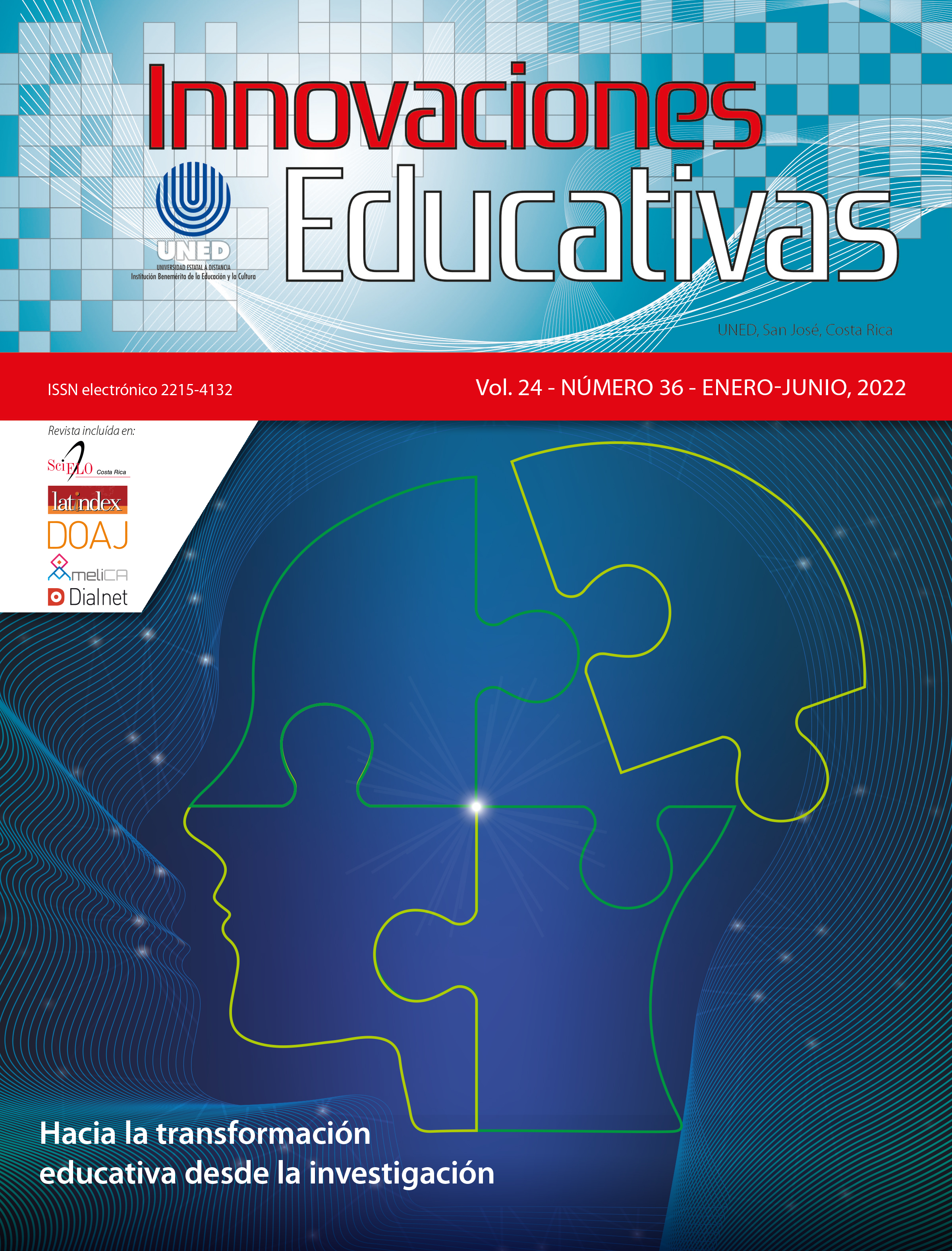Transition from face to face to virtuality in cooperative work activities In an inclusive theater workshop
DOI:
https://doi.org/10.22458/ie.v24i36.3896Keywords:
Cooperative work, theater, virtual education, special education, educationAbstract
The present systematization aims to analyze the transition of cooperative work in the Rompe Puzzle Theater Group, from face-to-face to virtual space, during the COVID-19 pandemic, in a theater workshop that aims to develop social skills in young people with disabilities. For this, a content analysis of the logs and videos of the work sessions in improvisation subgroups was carried out, in which 15 young people with disabilities participated, in addition to a survey of these and the people facilitating the space. It was found that the experience to adjust to virtuality, the type of activity that was already carried out in person, gave a more preponderant role to the facilitator to ensure the work dynamics of the subgroups. The technique consisted of subgroups and a basic premise to improvise together in the virtual session-whether a scene or a song, in person, or a joint story. A group structure of the informal type was used, making small groups randomly facilitating the role of the formal type, which guides the subgroups in cooperative work. Some of the components of this type of work were: positive interdependence, responsibility, and stimulating interaction were highlighted, and the need to strengthen social skills and group processing was identified. The relevance of investigating more about cooperative work techniques in the virtual and artistic environment for people with disabilities was identified.
References
CEDEÑO-MUÑOZ, J. C. y BARCIA-BRIONES, M. F. (2020). El aprendizaje cooperativo como estrategia educativa para estudiantes con discapacidades en bachillerato. Polo Del Conocimiento, 5(12), 616–636. https://doi.org/10.23857/pc.v5i12.2109
DELIYORE VEGA, M. (2021). Networks as a social communication space for virtual education in students with disabilities in Costa Rica in pandemic times | Redes como espacio de comunicación para la educación virtual de estudiantes con discapacidad en Costa Rica en tiempos de pandemia. Historia y Comunicacion Social, 26, 75–85.
GUERRERO, C. (2014). El ejercicio escénico como fenómeno propiciador del trabajo cooperativo y el aprendizaje significativo. Eutopía, 20, 72–77.
HERRADA VALVERDE, R. I. & Baños Navarro, R. (2018). Aprendizaje cooperativo a través de las nuevas tecnologías: Una revisión. @Tic. Revista D’Innovació Educativa, 20, 16. https://doi.org/10.7203/attic.20.11266
HUAUYA, B. (2021). Las nuevas prácticas digitales de docentes de cursos artísticos en la educación superior en Latinoamérica, a raíz de la pandemia COVID-19: Aproximaciones y experiencias. Revista internacional de pedagogía e innovación educativa, 1(2), 29-40.
HUETE, A. (2020). Pandemia y discapacidad . Lecciones a propósito del confinamiento. Revista Española de Discapacidad, 8(1), 203–207.
HURTADO TALAVERA, F. (2020). La Educación en Tiempos de Pandemia. CIEG Revista Arbitrada Del Centro de Investigación y Estudios Gerenciales, 44, 1–21. https://doi.org/10.52149/sp21/61.5
JOAN, R. (2018). Virtual Classroom: a Gift for Disabled Children. I-Manager’s Journal on School Educational Technology, 14(2), 7–11. https://doi.org/10.26634/jsch.14.2.15100
JOHNSON, D. y JOHNSON, F. (2014a). Joining together: Group theory and group skills (11th ed.). Pearson Education Limited.
JOHNSON, D. W. y JOHNSON, R. T. (2014b). Cooperative Learning in 21st Century. [Aprendizaje cooperativo en el siglo XXI]. Anales de Psicología, 30(3), 841–851. https://doi.org/10.6018/analesps.30.3.201241
JONES, S. y DOOLITTLE, E. (2017). Social and Emotional Learning: Introducing the Issue. The Future of Children, 27(1), 3-11. Retrieved July 23, 2021, from http://www.jstor.org/stable/44219018
KORIS, R. y VUYLSTEKE, J. F. (2020). Mission (im)possible: developing students’ international online business communication skills through virtual teamwork. In F. Helm & A. Beaven (Eds.), Designing and implementing virtual exchange - a collection of case studies (Issue im, pp. 69–79). Research-publishing.net. https://doi.org/10.14705/rpnet.2020.45.1116
ORR, S. (2010). Collaborating or fighting for the marks? Students’ experiences of group work assessment in the Creative Arts. Assessment and Evaluation in Higher Education, 35(3), 301–313. https://doi.org/10.1080/02602931003632357
PELLICANO, E. y STEARS, M. (2020). The hidden inequalities of COVID-19. Autism. https://doi.org/10.1177/1362361320927590
PÉREZ-ALDEGUER, S. (2013). Effects of Collaborative Musical Theater on the Development of Social Competence. Pérez-Aldeguer, S.-118-Electronic Journal of Research in Educational Psychology, 11(1), 117–138.
PETERS, B.; FORLIN, C.; MCINERNEY, D. & MACLEAN, R. (2013). Social Interaction and Cooperative Activities: Drawing Plans as a Means of Increasing Engagement for Children with ASD. International School of Whole Schooling, 9(2), 61–86.
SANDOVAL-POVEDA, A. y MADRIZ-BERMÚDEZ, L. (2020). Estrategias de acompañamiento virtual en un grupo de teatro inclusivo, durante tiempos de distanciamiento social. Virtual follow-up strategies in a Theatre Group in times of Social Distancing. Estratégias para o acompanhamento virtual em um grupo de teatro i. Innovaciones Educativas, 22 (N.° Especial), 200–212. https://doi.org/10.22458/ie.v22iespecial.3215
SCHWARZ AGUAYO, L. (2011). Ventajas del aprendizaje cooperativo para el logro de conductas adaptativas de las personas con discapacidad intelectual. Educación, 17, 88–90. https://doi.org/10.33539/educacion.2011.n17.1449
SEGUI, G. y DURÁN, D. (2011). Efectos del Aprendizaje Cooperativo en Niños Autistas. Revista Educación Inclusiva, 4(3), 12.
SILVA CRUZ, G. (2018). Estrategias de trabajo cooperativo y juegos grupales para favorecer las habilidades de interacción social en estudiantes con discapacidad intelectual y parálisis cerebral del 2do. grado de primaria, del Centro de Educación Básica Especial. N.° 005 Nuestro Señ [Instituto Pedagógico Nacional Monterrico]. In Estrategias Creativas Para Estudiantes Del IV Ciclo en el Nivel Primario.
SUMARDI, S. (2020). Adaptation To Emergency Remote Teaching: Pedagogical Strategy for Pre-Service Language Teachers Amid Covid-19 Pandemic. Turkish Online Journal of Distance Education, 22(2), 81–93.
TEMPRADO BERNAL, M. (2009). Ventajas del aprendizaje cooperativo para la socialización de los alumnos con necesidades educativas especiales. Revista Interuniversitaria de Formación del Profesorado, 65(23), 137–150. https://doi.org/10.2307/j.ctvn1tc6x.5

